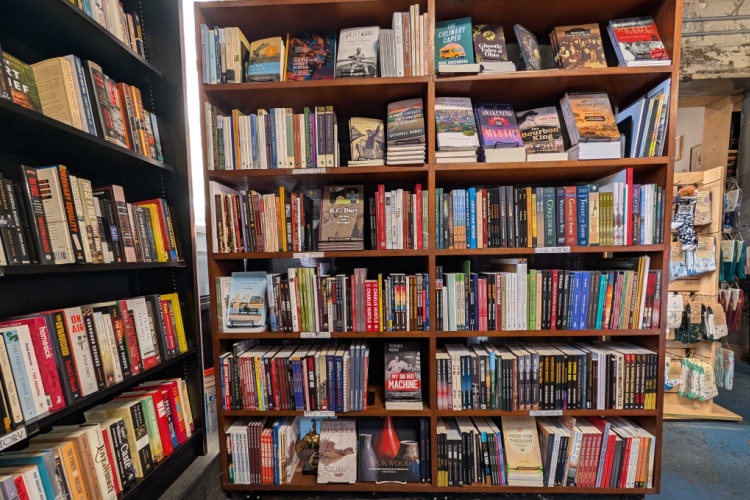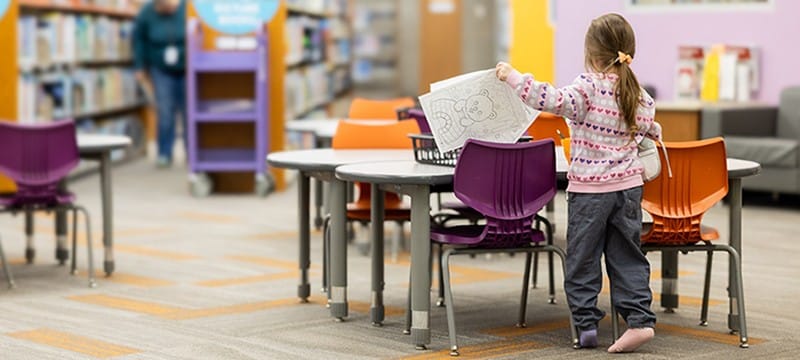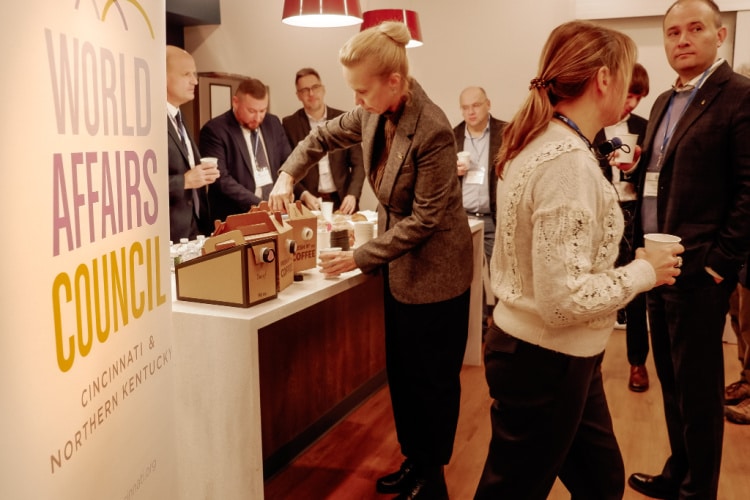Monkey in My Chair provides comfort, keeps classrooms connected
When Heidi Feyerherm’s daughter Chloe was diagnosed with cancer in 2006, the family was given a bear that wore a backpack so when Chloe was away from school receiving treatment, her classmates could keep in touch. “Her brother would bring the bear home on weekends, and the backpack had all the notes in it that her classmates had written,” Feyerherm says. “Chloe Bear is something we used during her first grade year until she passed away in 2007.” The stuffed bear played a significant role in the lives of both Chloe and her classmates, Feyerherm says. When Chloe passed away, Feyerherm wanted to expand the program and make it available to more people, but with added components. “We lived three hours away from the nearest Children’s Hospital, so there was no opportunity for a social worker to go to her school to explain what was going on,” Feyerherm says. “It was on my shoulders as the parent to talk to the classroom and talk to the teachers, so I thought if I wrote a book, it would make it easier for everyone going forward.” So Feyerherm started the Love Chloe Foundation and the Monkey in My Chair program—Chloe loved monkeys. In 2009, she began sending families monkey kits, which include a large stuffed monkey and a backpack that contains Feyerherm’s book, a journal, a camera, pens and paper and a teacher companion guide with lesson plans to help elementary school students cope with the extended absence of a classmate. Initially, the Kansas-based program reached four hospitals, but in 2011, Feyerherm developed a partnership with Cincinnati-based nonprofit The Cure Starts Now Foundation, and Monkey in My Chair now reaches children across the country and is in more than 130 hospitals nationwide. According to Feyerherm, the concept of cancer is a difficult one for children to accept, and in the time of need, it’s important that they, too, have a source of comfort. “Most of them—if they’ve had any experience talking about cancer—it’s been a grandparent or a great-grandparent,” Feyerherm says. “But the monkey gives them something physical to keep in their classroom and something they can hold on to. They might take turns—one might be responsible for carrying it to gym class, or they might take it to where they read their books—or they might hold it if they’re feeling sad.” The stuffed monkey also provides a sense of security for the child with cancer who misses extended time from school, Feyerherm says. “If a student’s been gone for seven or eight months out of the school year, it’d be easy for a teacher to take that desk out, and having the monkey physically there prevents that from happening,” she says. A recent development, which was implemented about a year and a half ago, is online access to Monkey Message, which allows the student to connect with his or her teacher and classmates at any time via email and photo sharing. “Sometimes the child will write about what they’re going through and take pictures of themselves going through their treatment and then send it back to the classroom, or it works the opposite way in the classroom for them to document what’s going on while the child is away,” Feyerherm says. “It makes them feel like they’re still there even if they’re not.” Do Good: • If you know a child who has been diagnosed with cancer and you think they might benefit from a monkey kit, they can request one here. • Contribute by making a donation or sponsoring a monkey kit. • Like Monkey in My Chair on Facebook and spread the word by sharing the page with friends. By Brittany York Brittany York is a professor of English composition at the University of Cincinnati and a teacher at the Regional Institute of Torah and Secular Studies. She also edits the For Good section of SoapboxMedia.
When Heidi Feyerherm’s daughter Chloe was diagnosed with cancer in 2006, the family was given a bear that wore a backpack so when Chloe was away from school receiving treatment, her classmates could keep in touch.
“Her brother would bring the bear home on weekends, and the backpack had all the notes in it that her classmates had written,” Feyerherm says. “Chloe Bear is something we used during her first grade year until she passed away in 2007.”
The stuffed bear played a significant role in the lives of both Chloe and her classmates, Feyerherm says. When Chloe passed away, Feyerherm wanted to expand the program and make it available to more people, but with added components.
“We lived three hours away from the nearest Children’s Hospital, so there was no opportunity for a social worker to go to her school to explain what was going on,” Feyerherm says. “It was on my shoulders as the parent to talk to the classroom and talk to the teachers, so I thought if I wrote a book, it would make it easier for everyone going forward.”
So Feyerherm started the Love Chloe Foundation and the Monkey in My Chair program—Chloe loved monkeys. In 2009, she began sending families monkey kits, which include a large stuffed monkey and a backpack that contains Feyerherm’s book, a journal, a camera, pens and paper and a teacher companion guide with lesson plans to help elementary school students cope with the extended absence of a classmate.
Initially, the Kansas-based program reached four hospitals, but in 2011, Feyerherm developed a partnership with Cincinnati-based nonprofit The Cure Starts Now Foundation, and Monkey in My Chair now reaches children across the country and is in more than 130 hospitals nationwide.
According to Feyerherm, the concept of cancer is a difficult one for children to accept, and in the time of need, it’s important that they, too, have a source of comfort.
“Most of them—if they’ve had any experience talking about cancer—it’s been a grandparent or a great-grandparent,” Feyerherm says. “But the monkey gives them something physical to keep in their classroom and something they can hold on to. They might take turns—one might be responsible for carrying it to gym class, or they might take it to where they read their books—or they might hold it if they’re feeling sad.”
The stuffed monkey also provides a sense of security for the child with cancer who misses extended time from school, Feyerherm says. “If a student’s been gone for seven or eight months out of the school year, it’d be easy for a teacher to take that desk out, and having the monkey physically there prevents that from happening,” she says.
A recent development, which was implemented about a year and a half ago, is online access to Monkey Message, which allows the student to connect with his or her teacher and classmates at any time via email and photo sharing.
“Sometimes the child will write about what they’re going through and take pictures of themselves going through their treatment and then send it back to the classroom, or it works the opposite way in the classroom for them to document what’s going on while the child is away,” Feyerherm says. “It makes them feel like they’re still there even if they’re not.”
Do Good:
• If you know a child who has been diagnosed with cancer and you think they might benefit from a monkey kit, they can request one here.
• Contribute by making a donation or sponsoring a monkey kit.
• Like Monkey in My Chair on Facebook and spread the word by sharing the page with friends.
By Brittany York
Brittany York is a professor of English composition at the University of Cincinnati and a teacher at the Regional Institute of Torah and Secular Studies. She also edits the For Good section of SoapboxMedia.















